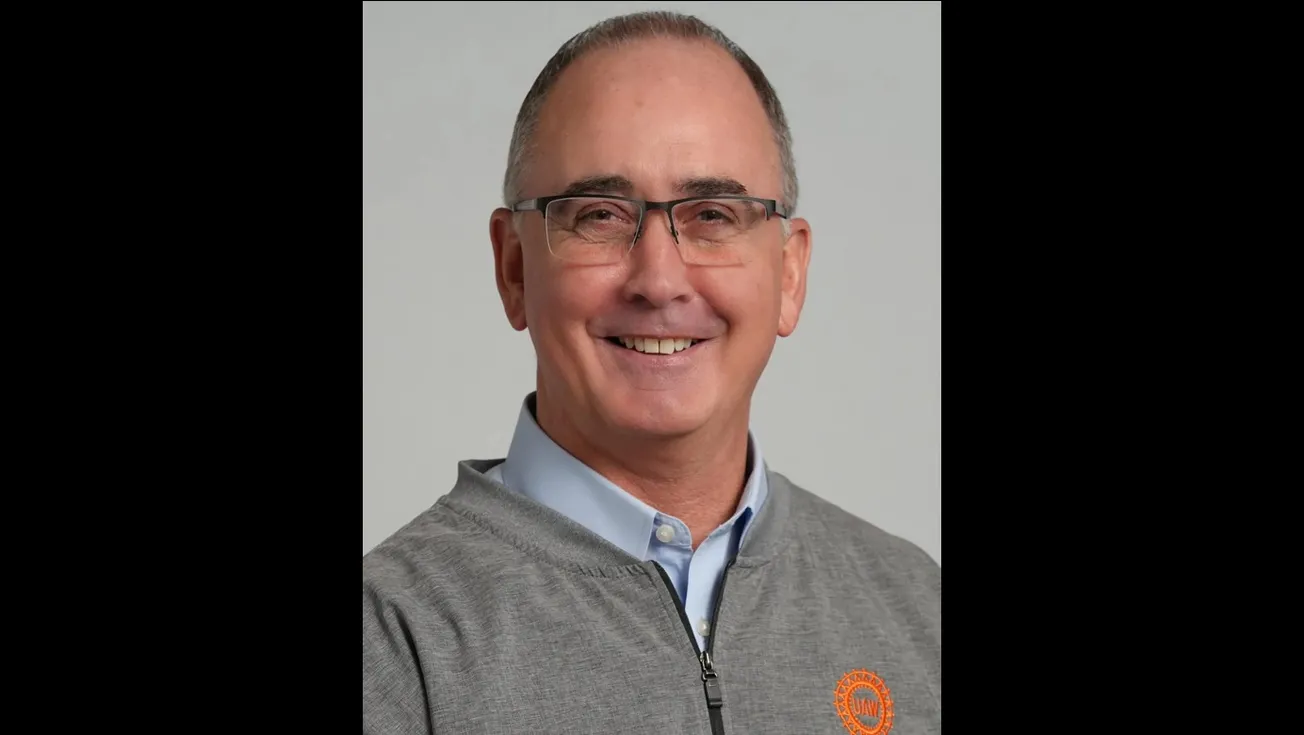President Joe Biden praised United Auto Workers President Shawn Fain as a union “leader with a backbone like a ramrod” who’s “done one hell of a job.”
Fain is slated to be a featured speaker at the Kentucky State AFL-CIO’s biennial convention in Lexington, Dec. 4-5, with registration on Dec. 3. He’ll share the podium with others including International Brotherhood of Teamsters General Secretary-Treasurer Fred Zuckerman, a Kentuckian; United Mine Workers of America President Cecil Roberts, a convention regular; and Sara Nelson, international president of the Association of Flight Attendants-Communication Workers of America. She and Roberts spoke at the 2019 convention.
Fain recently led the UAW to victory in the union’s “Stand-Up” strike against Detroit’s Big Three automakers. Union members ratified an agreement the union president hailed as “one of the most stunning contract victories since the sit-down strikes in the 1930s.” The pact included record wage and benefit hikes.
According to The Nation’s John Nichols, “Fain, narrowly elected in March as a reformer backed by the rank-and-file Unite All Workers for Democracy caucus, Fain pulled together a bargaining team that demanded double-digit pay increases, an end to a tiered system that paid new workers less than existing ones, the restoration of the cost-of-living adjustments that had been sacrificed when the UAW helped save the auto companies during the Great Recession, a four-day workweek, and a say in the future of an industry that’s transitioning to electric-vehicle production.”
Worried that the UAW contract with General Motors, Ford, and Stellantis might tempt their hourly workers to unionize, officials at a half-dozen foreign-owned stateside vehicle manufacturing plants — Volkswagen, Nissan, Hyundai, Honda, Toyota, and Subaru — gave them raises. The pay boots amount to a preemptive strike against the union. (Japan-based Toyota’s Georgetown facility is the company’s largest factory.)
At a Senate hearing titled “Standing Up Against Corporate Greed: How Unions Are Improving The Lives Of Working Families,” Fain characterized the pay raises at non-union auto plants as “the UAW bump,” which he said “stands for ‘U Are Welcome,’ and we’re very proud of that.” Fain added that “when these members decide to organize and join the UAW, they’re going to realize the full benefit of union membership and get what they’re fully due.”
The UAW aims to organize the stateside non-union, foreign-owned auto plants, plus electric car manufacturer Tesla, owned by billionaire bigot and union-hater Elon Musk, who mocked “‘the union’s expansive agenda,’” according to Nichols. So did anti-union commentators like CNBC’s Jim Cramer, and Donald Trump, who by word and deed was one of the most anti-union presidents.
Added Nichols: “In stark contrast to President Biden, who joined a UAW picket line and told striking workers, ‘You deserve what you earned, and you deserve a hell of a lot more than you’re getting paid now,’ Trump dismissed the strike as a waste of time. ‘You’re all on the picket lines and everything, but it doesn’t make a damn bit of difference what you get, because in two years you’re all going to be out of business,” the former president claimed in a speech at a nonunion plant outside Detroit in which he ripped efforts by the Biden administration, auto companies, and unions to modernize the industry and make the US a leader in electric-vehicle production.
“That was a classic line of attack from Trump, a real estate mogul and reality-TV star whose understanding of American manufacturing has always been suspect and whose promises to save auto workers’ jobs fell miserably short during his presidency. But Trump’s efforts to divide workers against themselves — and to suggest that only he could save their jobs — got no traction; Fain proved to be a more effective communicator than the Republican front-runner and, for that matter, most Democrats. In a struggle against the billionaire class, the UAW argued, workers had to fight back. The union’s ‘Stand Up’ strategy of having workers walk out at key plants without warning proved to be strategically brilliant, as it left auto execs struggling to figure out where they’d be hit next.”
While the AFL-CIO has endorsed Biden’s reelection, the UAW hasn’t. But Fain made it clear that he's not a Trump fan. “Every fiber of our union is being poured into fighting the billionaire class and an economy that enriches people like Donald Trump at the expense of workers,” he said in an emailed statement. “We can’t keep electing billionaires and millionaires that don’t have any understanding what it is like to live paycheck to paycheck and struggle to get by and expecting them to solve the problems of the working class.”
The union-busters yelp “class warfare!” and “socialism!” when union leaders like Fain talk about working class solidarity. For years, foes of organized labor have been trying to divide the working class by pandering to the worst in the body politic, notably selfishness, racism, sexism, nativism, religious bigotry, homophobia and, of late, anti-trans prejudice.
Fain reminds me of the leaders of the old Knights of Labor. Founded in 1869, the K of L was 19th century America’s largest labor organization and an ancestor of the AFL-CIO. All but gone by the turn of the 20th century, the Knights “tried to teach the American wage-earner that he was a wage-earner first and a bricklayer, carpenter, miner, shoemaker, after; that he was a wage-earner first and a Catholic, Protestant, Jew, white, black, Democrat, Republican, after,” historian Norman J. Ware wrote. (I’d add “teacher” to the list.)
The Knights’ motto was “That is the most perfect government in which an injury to one is the concern of all.” Membership in the union peaked at nearly 800,000 in the mid-1880s. While it began in Philadelphia, the union wasn’t confined to big cities or the U.S; the Knights expanded nationwide and beyond to Canada, Europe, Australia, and New Zealand.
The K of L boasted 177 local assemblies in Kentucky, mainly in Louisville and Covington, according to John Hennen, an author and retired Morehead State University historian.
The K of L “proposed to organize industrial society on a cooperative basis,” stressing “solidarity among ‘workers of all skill levels, races, and ethnicities’” while seeking “to secure to the toilers a proper share of the wealth that they create,” Hennen wrote in The Register of the Kentucky Historical Society.
“Solidarity among ‘workers of all skill levels, races, and ethnicities’” and seeking “to secure to the toilers a proper share of the wealth that they create” were bywords of the Congress of Industrial Organizations. Founded in the 1930s, it included the UAW.
“So mark your calendars,” Nichols concluded. “And look for more than just strikes. Promising to ‘organize like we’ve never organized before,’ Fain says that ‘when we return to the bargaining table in 2028, it won’t just be with the Big Three but with the big five or big six.’ Be warned, Elon Musk: The UAW means business.”
--30--
Cross-posted from the KY AFL-CIO web site.








